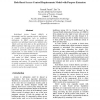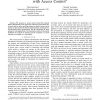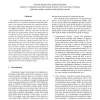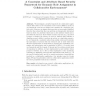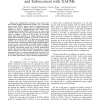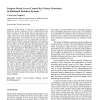118
Voted
WER
2007
Springer
15 years 8 months ago
2007
Springer
Role-Based Access Control (RBAC) is increasingly used for ensuring security and privacy in complex organizations such as healthcare institutions. In RBAC, access permissions are g...
150
Voted
NCA
2007
IEEE
15 years 8 months ago
2007
IEEE
We present FRAC, a Framework for Role-based Access Control in network file systems. FRAC is a reference monitor that controls the message flow between file system clients and s...
171
Voted
IPCCC
2007
IEEE
15 years 8 months ago
2007
IEEE
Role-based access control and role hierarchies have been the subject of considerable research in recent years. In this paper, we consider three useful applications of a new role-b...
135
Voted
NTMS
2008
IEEE
15 years 9 months ago
2008
IEEE
—We propose an access control model that extends RBAC (Role-Based Access Control) to take time and location into account, and use term rewriting systems to specify access control...
151
Voted
ISORC
2008
IEEE
15 years 9 months ago
2008
IEEE
In this paper, a Role-based Access Control (RBAC) model is applied and extended to a multimedia version called Multi-Role Based Access Control (MRBAC), which can fully support the...
129
Voted
EDOC
2008
IEEE
15 years 9 months ago
2008
IEEE
The definition and management of access rules (e.g., to control the access to business documents and business functions) is an important task within any enterprise information sy...
116
click to vote
COLCOM
2008
IEEE
15 years 9 months ago
2008
IEEE
Abstract. We investigate a security framework for collaborative applications that relies on the role-based access control (RBAC) model. In our framework, roles are pre-defined and...
120
click to vote
POLICY
2009
Springer
15 years 9 months ago
2009
Springer
Abstract—An administrative role-based access control (ARBAC) model specifies administrative policies over a role-based access control (RBAC) system, where an administrative perm...
122
click to vote
TACAS
2009
Springer
15 years 9 months ago
2009
Springer
Abstract. Role-Based Access Control (RBAC) has been widely used for expressing access control policies. Administrative Role-Based Access Control (ARBAC) specifies how an RBAC poli...
227
Voted
VLDB
2008
ACM
16 years 2 months ago
2008
ACM
Abstract In this article, we present a comprehensive approach for privacy preserving access control based on the notion of purpose. In our model, purpose information associated wit...
